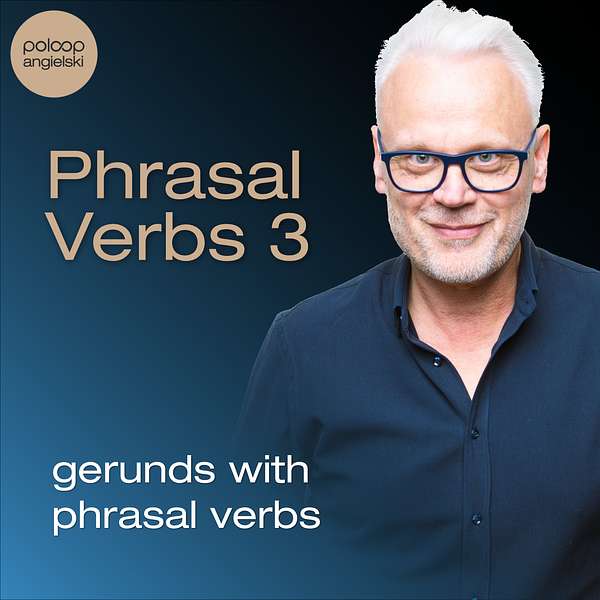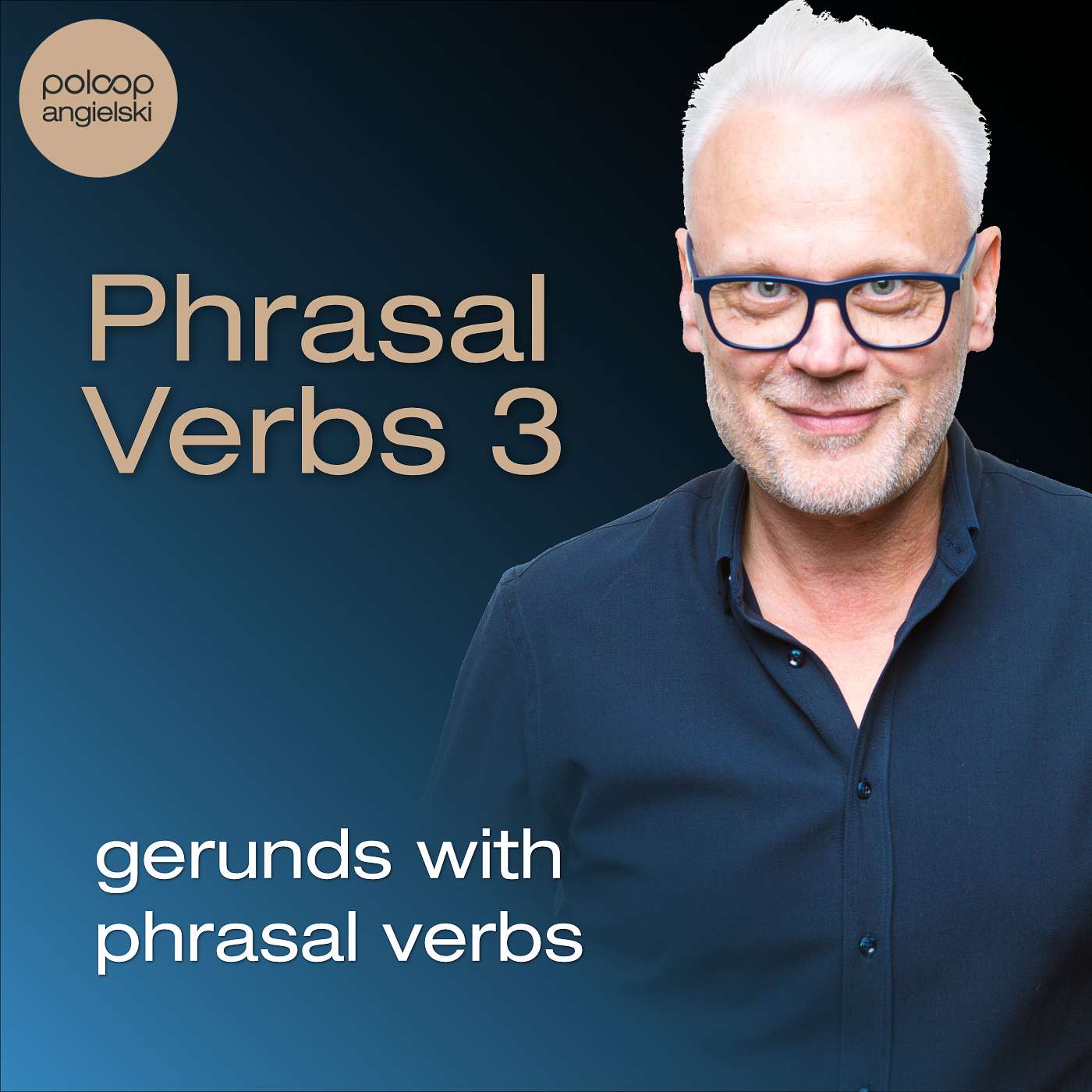
PoLoop Angielski
PoLoop Angielski
Episode 19. Gerunds with Phrasal Verbs
Verbs sometimes want to act like adjectives or nouns. In order to take on their new role they need the -ing ending. In this episode I expose their clever trick :-)
You can download the transcript of this episode here.
Phrasal Verbs used in the recording:
FEEL UP TO sth/doing sth : When you don't feel up to something, you don't have enough strength or energy to do it or deal with it.
GIVE something UP : If you give up something, you stop doing it or having it.
COUNT ON something: If you count on something, you are sure something will happen.
REIN something IN : If you rein something in, you start to control something.
LAY somebody OFF : If a company lays off employees, it stops employing them because there is not enough. work for them to do.
Other interesting words and expressions used in the recording:
- worthwhile: If something is worthwhile, it is important or enjoyable enough to spend time, money or effort on
- a pint: a pint of beer
- Pegasus: a horse with wings from Ancient Greek and Roman stories
- to give somebody a headache: to be a source of pain but also to annoy someone
- to browse through the news: to look through the news stories
- to rob somebody of something: to steal money or property from someone
- to get into the swing of doing something: to get fully involved in an activity
Takeaway 1: Verb+ing can form continuous tenses, or function like an adjective or a noun in a sentence. In this role, it is known as a gerund.
Takeaway 2: After prepositions we generally use gerunds, and since Phrasal Verbs often end with prepositions, we use gerunds after them too.
You can find Relevant Today phrases mentioned in the recording on my Instagram Profile.
For more, visit: PoLoop Angielski Blog
Drop me a line: jacek@poloopangielski.pl
And join us on social media: Instagram and Facebook
Would you like me to help you master your English? You can find out more about my courses here.
0:01
Hello there, I'm Jacek Olender. Welcome to PoLoop Angielski podcast - episode 19. For the transcript of this recording and more materials for learners of English, go to my website, poloopangielski.pl
0:18
The other day I got this question from one of my listeners, Magda, about something she noticed when she was listening to Episode 17. The one about three-part phrasal verbs. She spotted that often what follows the phrasal verb is a word with the -ing suffix, the -ing ending. For example, one of the sentences I used to illustrate the meaning of the phrasal verb 'feel up to' went like this, 'Sorry, mate. But I just don't feel up to having a pint tonight.' Magda wants to know why we use the verb 'have' with the -ing ending in this sentence, and if we can say, for example, 'Sorry mate, but I just don't feel up to have a pint tonight.' I decided that before answering Magda's question, it would be worthwhile to get a more general look at these words with the -ing at the end.
1:28
As I am sure you know, most often we use verbs with -ing at the end in continuous, also known as progressive tenses. I am recording a podcast right now. I am sitting in my chair. And as I'm recording this very early in the morning, most of you are probably sleeping. In all these sentences, we add -ing to verbs to say that we are in the middle of performing all these actions. But there are other cases when adding -ing does something more spectacular, I would say almost magical. It can change the function of the word, and we can transform the verb, so that we can use it like an adjective or a noun. Let me show you how. Let's take the verb 'fly'. Do you know what Pegasus is? No, I don't mean the infamous Israeli software used by some governments to spy on their citizens. I mean, the strange creature from ancient Greek and Roman stories, a horse with wings. We can say that Pegasus is a flying horse. The word 'flying' in this expression functions not as a verb, but like an adjective describing a horse. Let's now do another magic trick, and change the same verb 'fly' into a noun, as in this sentence, 'Flying is safe.' What is safe? Flying. Flying is a subject of the sentence. The subject is what we usually start a sentence with. It's a doer of an action. And it's usually a noun or a noun phrase, or, like in the case of the sentence, 'Flying is safe.' the subject is the verb with -ing at the end. And when we use verbs with -ing at the end, we often call them gerunds. So, a gerund is a sort of noun-like verb or a verb pretending to be a noun. And it can be really useful. It can be used in all situations in which a noun is normally used. For example, after another verb. I can say, 'I enjoy crime books', but I can also say, 'I enjoy reading crime books'. So instead of a noun object, I've just used a fake noun, a gerund. So, we use these noun imitators after a lot of verbs. We also use gerunds after prepositions. Just in case you're not familiar with the term 'prepositions'. They are those little words that give learners of English a big headache, such as in, on, at, off, by, after, with, without, etc. We very often don't know where to use which. So after prepositions, we usually use nouns or noun phrases. For example, 'I'm on the bus.' 'I'm afraid of big dogs.' 'I dried my hair after shower.' But what about if I want to use a verb after a preposition? Can I say, for example, 'I dried my hair after have a shower?' I'm afraid not. But we can use a fake noun, a gerund, and we can say, 'I dried my hair after having a shower.' Similarly, we can say, 'I'm afraid of flying.' 'My students are excellent at using phrasal verbs' and so on.
5:56
And this brings me to the answer to Magda's question about using the -ing form of the verb 'have' in the sentence, 'Sorry, mate, but I just don't feel up to having a pint tonight'. A lot of phrasal verbs end with prepositions, after which we need to use an object. And this object could be a noun phrase, or a gerund. 'I gave up cigarettes', or 'I gave up smoking'. 'She's counting on a loan from the bank', or 'She's counting on getting a loan from the bank'. 'I don't feel up to it,' or 'I don't feel up to having a pint'. So Magda, gerunds are a common feature in the sentences with phrasal verbs. Thank you for your question. And if you have a question that you want me to address in this podcast, please drop me a line, you can find my email address in the notes.
7:05
Some of you may know that on my Instagram profile, I regularly post expressions which I call 'relevant today'. Basically, every day, usually in the morning, I browse through the news and I choose one phrase that I explained in the post on poloop_angielski profile. These posts often feature phrasal verbs. So if you are into learning phrasal verbs in the context of current news stories, you can find them on Instagram. Last week, I posted two phrasal verbs 'to rein something in' and 'lay somebody off'. The former one came from the news story about Americans, who are apparently less enthusiastic about shopping. November figures show that consumers in the US reined in spending. You see, not reined in 'spend' but the gerund 'spending'. if you rein something in, you start to control it. When you rein in spending, you start to control how much you spend. You can learn from the post that the expression comes from horse riding. Reins are these narrow leather straps that are attached to a metal bar in a horse's mouth, and are held by the rider in order to control the horse. So reins give you the control over the horse. If you rein in spending, you control how much you spend, you're more careful how much you spend. So Americans spent less money in November, probably because of the inflation that robs people of their savings. But let's hope that more careful consumers in America could rein in the inflation. Yes, you can rein in not only spending but also inflation. to rein in inflation means to bring it under control.
9:28
Hope you don't have to rein in your spending, and you've got into the swing of preparations to Christmas. This is the last episode this year. I don't think any of you will feel up to listening to me over Christmas. Enjoy the festive season and I hope you join me for another episode in the new year. Merry Christmas everyone and Happy New Year. Bye





